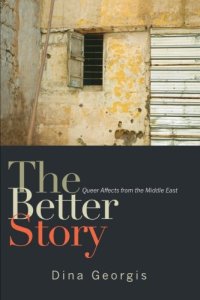
Ebook: The Better Story: Queer Affects from the Middle East
Author: Dina Georgis
- Tags: Nonfiction, Activism, Bisexuality, Civil Rights, Coming Out, Philosophy, Sexuality, Transgender, Gay & Lesbian, Criticism & Theory, History & Criticism, Literature & Fiction, Feminist, Movements & Periods, History & Criticism, Literature & Fiction, Middle Eastern, Regional & Cultural, History & Criticism, Literature & Fiction, Gay & Lesbian, Specific Demographics, Social Sciences, Politics & Social Sciences, Women Writers, Women’s Studies, Politics & Social Sciences, Race Relations, General, Discrimination & Racism, Sociol
- Year: 2014
- Publisher: State University of New York Press
- Language: English
- pdf
Illuminates the emotional significance of stories in response to racial traumas related to the Middle East.
With a focus on aesthetic texts that narrate stories about or from the Middle East, The Better Story offers fresh insights into political conflict. Dina Georgis argues that narrative is an emotional resource for learning and for generating better political futures. This book suggests that narrative not only gives us insight into social constructs, but also leads us into understanding the enigmatic processes by which we become and give our “selfs” over to collective memories, histories, and identities. Stories link us to queer “forgotten” spaces that official history has discarded. The Better Story argues that feminist, queer, and postcolonial studies have not helped us think about lives that do not neatly fit into the valorized logic of resistance and emancipation.
“The Better Story highlights the centrality of narrative as a means by which to frame a theory of affect and representation. It builds on the key insight that stories are founded in loss and, therefore, bear the marks of suffering, grief, melancholy, and reparation. This ‘haunting’ is the place from which the author begins an investigation into colonial subjectivity and its histories of/and affect. The author’s use of ‘queer’ to describe stories which incite and realize complex and ever emerging affective dynamics is both compelling and effective. As an account of such complexities, it is well done and convincing. The Better Story is a better story.” — Ursula A. Kelly, author of Migration and Education in a Multicultural World: Culture, Loss, and Identity
With a focus on aesthetic texts that narrate stories about or from the Middle East, The Better Story offers fresh insights into political conflict. Dina Georgis argues that narrative is an emotional resource for learning and for generating better political futures. This book suggests that narrative not only gives us insight into social constructs, but also leads us into understanding the enigmatic processes by which we become and give our “selfs” over to collective memories, histories, and identities. Stories link us to queer “forgotten” spaces that official history has discarded. The Better Story argues that feminist, queer, and postcolonial studies have not helped us think about lives that do not neatly fit into the valorized logic of resistance and emancipation.
“The Better Story highlights the centrality of narrative as a means by which to frame a theory of affect and representation. It builds on the key insight that stories are founded in loss and, therefore, bear the marks of suffering, grief, melancholy, and reparation. This ‘haunting’ is the place from which the author begins an investigation into colonial subjectivity and its histories of/and affect. The author’s use of ‘queer’ to describe stories which incite and realize complex and ever emerging affective dynamics is both compelling and effective. As an account of such complexities, it is well done and convincing. The Better Story is a better story.” — Ursula A. Kelly, author of Migration and Education in a Multicultural World: Culture, Loss, and Identity
Download the book The Better Story: Queer Affects from the Middle East for free or read online
Continue reading on any device:

Last viewed books
Related books
{related-news}
Comments (0)